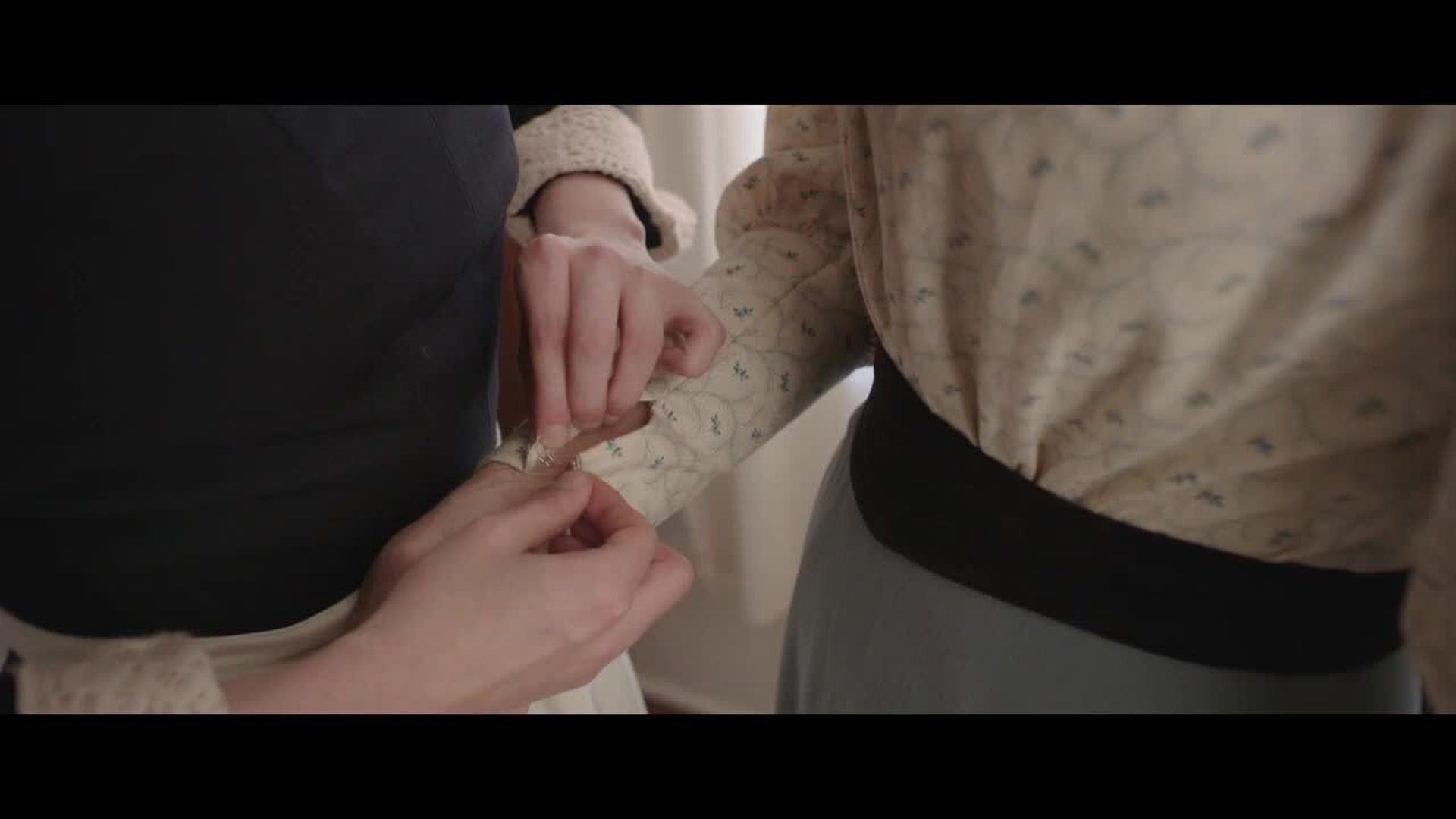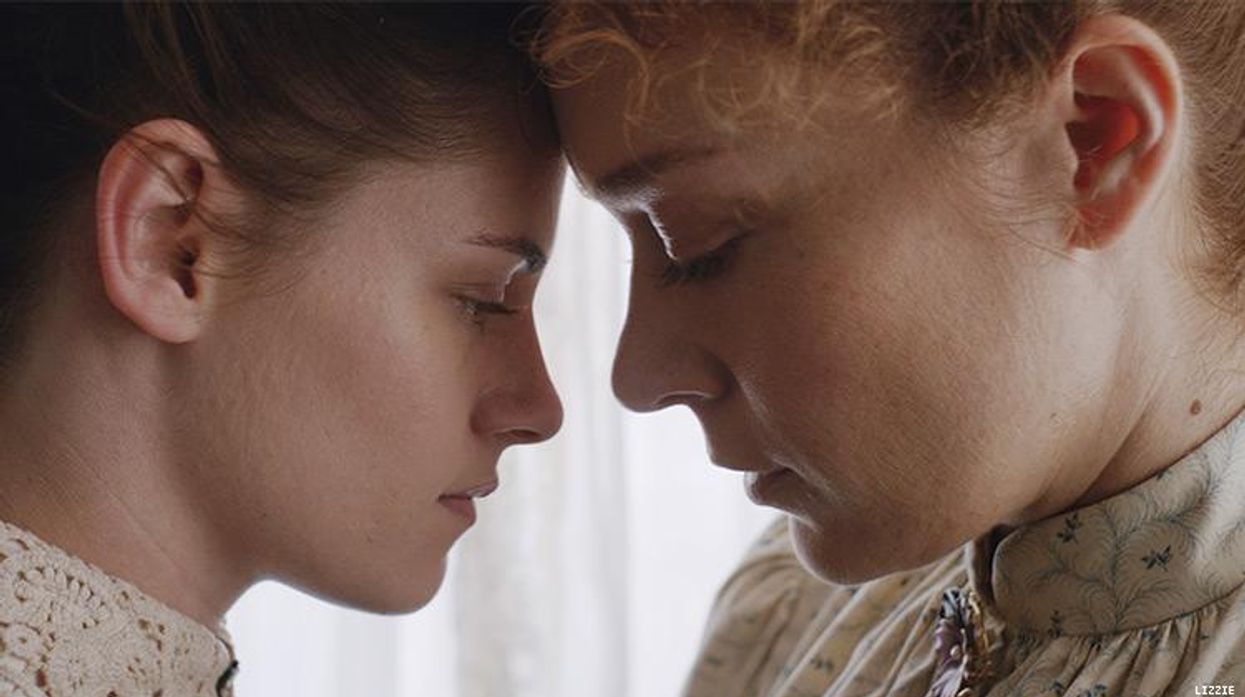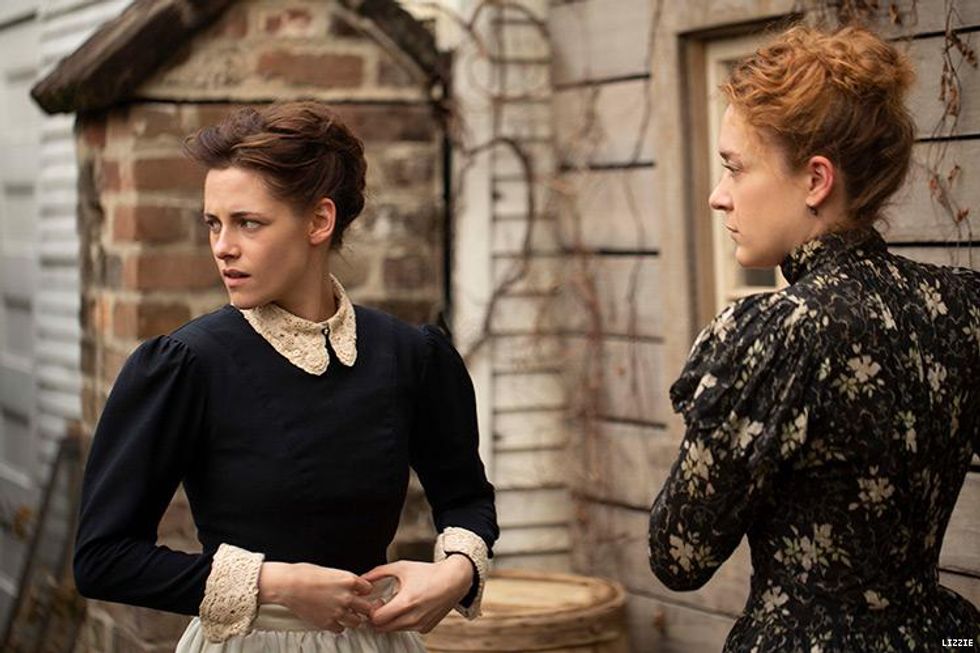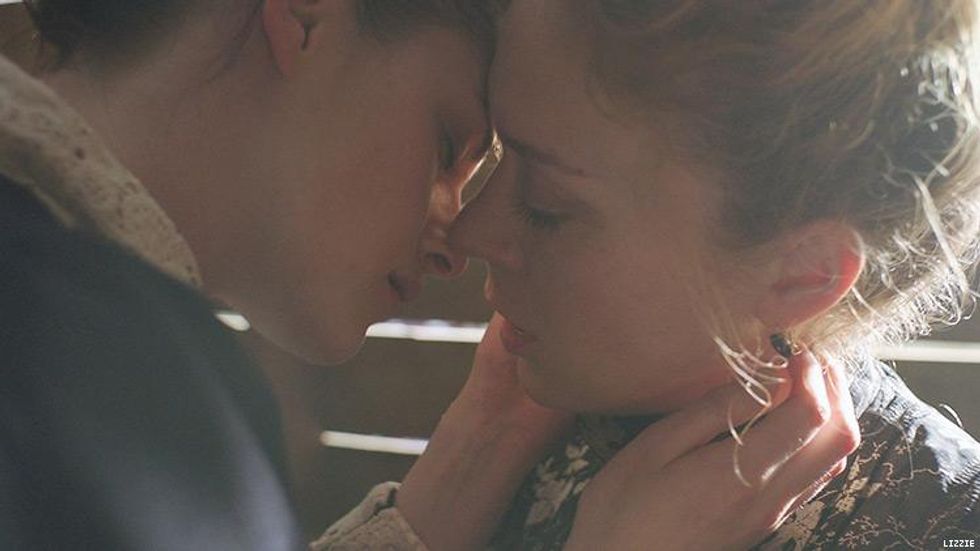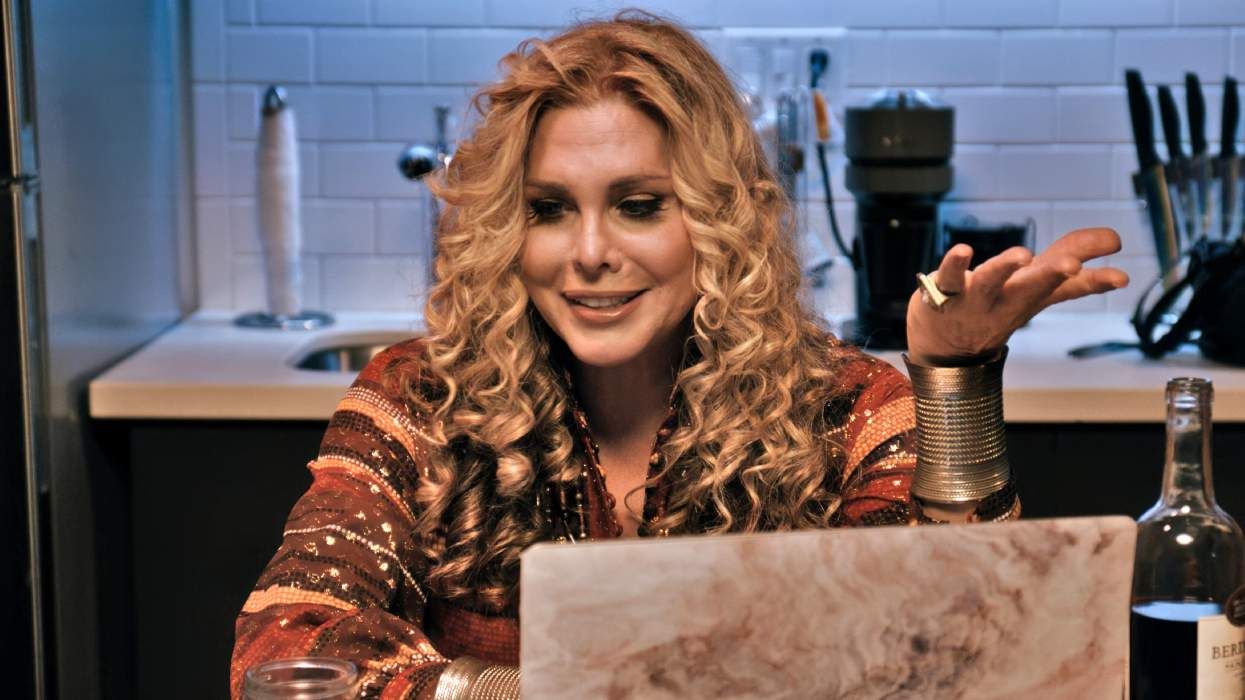For the nearly hour and a half that precedes the notorious moment when Lizzie Borden "took an ax and gave her mother 40 whacks" in actress Chloe Sevigny's passion project Lizzie, the camera lingers on her caught behind windowpanes and the bars of a stairwell. Those shots telegraph that she's already a prisoner in her home with a miserly, abusive father and his complicit wife. By the time she enters prison to await trial for their gruesome murders, it's a respite from the purgatory that was her life.
Part revenge tale and part redemption song, Lizzie took years for indie darling Sevigny (Boys Don't Cry, Big Love, Love and Friendship) and out writer Bryce Kass to shepherd to the screen, and endured several iterations along the way. But this version of the ax killer from the tiny town of Fall River, Mass., couldn't have come at a timelier moment. A film that shares a lineage with the queer true crime-based films of the '90s like Heavenly Creatures and Sister My Sister, Lizzie is a completely fresh take on the murderous lesbians trope. The movie also fits right in with the #MeToo era, with Lizzie and her maid/love interest/co-conspirator Bridget (Kristen Stewart) literally bashing toxic masculinity in the face.
"I think she did it. Yes, I do. I think she snapped," Sevigny tells The Advocate. Borden was charged with the 1892 murders of her father and stepmother, but was acquitted because the male jury couldn't believe that a woman of her social standing was capable of such savagery.
Since Lizzie premiered at Sundance early this year, much has been made of the scene in which Sevigny's Lizzie and Bridget undress, stripping away the sartorial constrictions of 19th-century New England to commit the murders. Prior to bludgeoning her stepmother, Abby (Fiona Shaw), Lizzie unbuttons her dress, drops her corset, and steps out of it completely nude in order to preserve her garments. Director and horror wunderkind Craig William Macneill (The Boy) shrewdly juxtaposes the undressing scene with an earlier moment in the film in which Bridget gingerly, lovingly fastens the buttons on Lizzie's cuff in a prelude to their eventually consummating a physical relationship.
While the scene in which Sevigny's denuded Lizzie repeatedly brings the ax down on her stepmother has already been written about at length, it's no less shocking for the viewer to experience that visceral release with her.
"[The murder scene] was kind of my idea ," Sevigny says. "I feel like the audience deserved that and Lizzie deserved that. I wanted her to strip off those social restrictions -- a.k.a. the corset -- and then just get carnal. She was just adrenaline. Did she even think that she was actually going to do it? Once she started, she couldn't stop."
But, at least as rendered in Sevigny's version, Lizzie's crimes are not without cause. Unmarried and often sickly (she is said to have suffered from epileptic seizures), Lizzie lives with her parents and her sister Emma (Kim Dickens) under the draconian rules of her father, Andrew (Jamey Sheridan). He allegedly eschewed paying for lighting although he had the money to do so, and in this version, he repeatedly sexually abuses Bridget, while his wife -- aware of his predations -- awaits his return to their bed. Meanwhile, Lizzie is subjected to violent altercations with her smarmy Uncle John (Denis O'Hare), who seeks Andrew's fortune at the expense of the Borden sisters' financial safety net. And all the while, she's continually threatened with being sent to an asylum for the transgression of being a woman who refuses to adhere to the rules set forth by men.
The film was written and in production well before the reckoning around sexual abuse that played out last fall, so while the #MeToo element of Lizzie was inherently inscribed in the work, Sevigny says that the discussion about abuse caused her to view some of the movie's themes in a different light than when it was initially conceived.
"It is so much more real," Sevigny says of the sexual abuse in the film. "Not that I didn't believe it was a real thing to talk about then, but now it's just what she represents as this American outlaw that questions the status quo and the tyrants and the oppressors and the patriarchy."
"This is a movie about smashing the patriarchy!" is how she pitched the film to Stewart, Sevigny says.
As much as Lizzie is about taking down the patriarchy, it's also about female solidarity. And Sevigny, working with an independent film budget, luring A-lister Stewart to the project was more than a coup.
"I had to try and seduce her," Sevigny laughs. "I got her number, and I was sending her text messages about the story and what it meant to me and why I thought she would be good for the part."
Following a meeting in a Los Angeles cafe, Stewart came on board. "There was a mutual admiration, and she was like, I just want to help you," Sevigny says, adding that she's done the same for some of her friends looking to get projects off of the ground.
Borden has been a subject of cultural fascination since the murders were committed. The story has inspired the popular children's rhyme, a Broadway musical number, a ballet, a short story, and a recent television series starring Christina Ricci, to name a few iterations. Sevigny admits to becoming fascinated with Borden and the crimes once she really began to dig into the subject.
"I think that it's still unsolved and people can project all of their own ideas on it and explore it. Any true crime, especially unsolved crime, people want to play the investigator," she says of the ongoing interest. "Even I did when I started doing research -- going to the house, reading different books, reading newspaper articles and court transcripts."
"I'm going to find the real truth to the Lizzie Borden story!'" was her initial reaction to discovering the clues, she says. "Nobody's ever going to know the real truth," she concedes.
What did captivate Sevigny and the writer Kass was the idea that among the transcripts, newspaper articles, and think pieces of the era, there was little information about what went on behind the walls of the Borden household. And so the pair landed on the idea -- the real Borden is rumored to have had an affair with actress Nance O'Neil -- that Borden not only had an accomplice in Bridget but that the women were in love.
"There's no way Bridget could not have been in cahoots," Sevigny says. The actress and Kass made that determination after a visit to the Borden house. "There's no way they couldn't have done this together. And there's no way Lizzie couldn't have been aware. There are two hours between each murder and they were both right outside. We ran with that. Of all the other things we read, all of the hypotheses and theories, it was the actual space that led us to our story."
Beyond writing Bridget as an accomplice for Lizzie to explain the logistics of the murders, Sevigny and Kass landed on giving the infamous spinster a love story to help drive the action of the film.
"I had a lot of empathy toward her. She had a rich inner life and she didn't have a lot of outlets," Sevigny says of Lizzie, who's depicted as being an avid reader and a patron of the arts.
"I felt like a lot of the world outside of Fall River was changing, but in that Calvinist community she was really smart. She had a lot to say and no one to say it to," Sevigny adds. "That's where we wanted to build the relationship with Bridget for her -- that Bridget was finally an outlet. It felt like she deserved that love and an escape from her horrid existence."
Amid the emotional abuse Lizzie endures from her father and the midnight visits he makes to Bridget's room to rape her, the women find solace in each other. It begins with a bit of pedagogy as Lizzie helps Bridget to read and write but graduates to furtive glances and brushing each other's hands as they pass notes in the stairwell, and eventually to a sexual release.
In her essay, "Lethal Lesbians: The Cinematic Inscription of Murderous Desire," film historian B. Ruby Rich writes of films that play into the murderous lesbian trope, like the aforementioned Peter Jackson's Heavenly Creatures and Nancy Meckler's Sister My Sister (a film that Sevigny says she loves and sent to Stewart to watch in preparation for the role), in which incestuous maids murder their employer and her daughter. In these movies, murder is the ultimate consummation of the relationship. While the depiction of the murders in Lizzie is the denouement of the film, Sevigny says she wanted Lizzie and Bridget to have a sexual consummation as well.
"We wanted to give that to them. The movie is so restrained and so buttoned-up. And you see them in passing, these moments of almost touching and those kinds of period romance cliches. But they also work and they are also titillating to me," Sevigny says. "I think the way that we did the sex scene -- we're not naked. We're still confined by these garments. We need each other."
